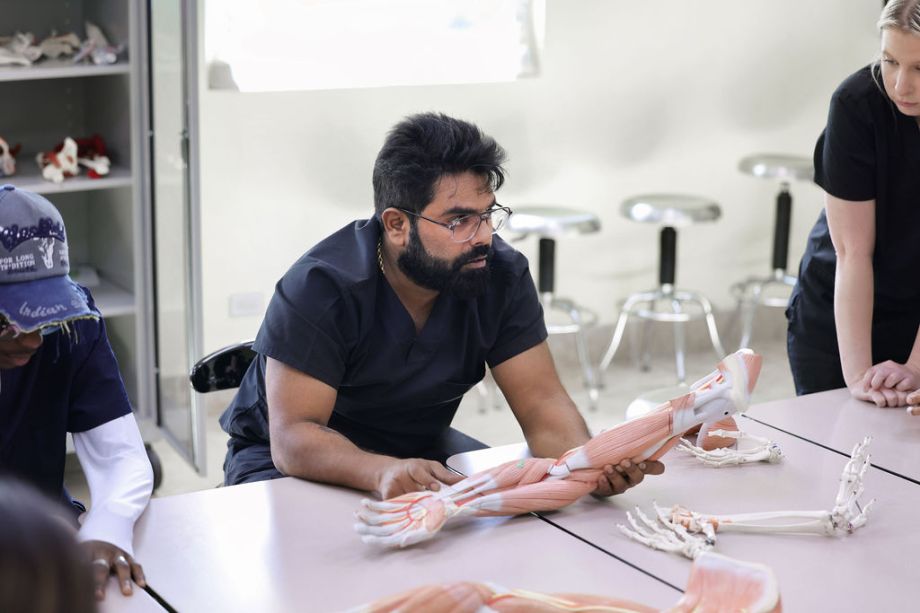
MBBS vs MD: Key Differences Explained for Aspiring Medical Students
Explore the differences and similarities between an MD and MBBS degree.
Choosing the right path in medicine is one of the biggest decisions any aspiring doctor will make. The terminology can get confusing, especially when you’re comparing degrees like MBBS vs MD. While both can lead you to a successful career as a practicing physician, they represent different stages and approaches to medical education.
This guide covers the essentials of each degree – their differences, career implications and how to choose the right one for your goals. Whether you’re planning to practice in the U.S., Canada or elsewhere, we’ll break down what you need to know.
What Is an MBBS Degree?
The MBBS degree, or Bachelor of Medicine and Bachelor of Surgery, is the main professional undergraduate medical degree in countries following the United Kingdom’s medical education system. This includes places like India, the United Kingdom, Australia, UAE, many African countries, select European countries and other British Commonwealth nations (international association of 56 member states).
The full name of MBBS makes it clear what it is: a dual bachelor’s degree covering both medicine and surgery. Students who complete an MBBS program earn the title of doctor and can become licensed medical practitioners, qualified to diagnose, treat and perform surgery.
- Duration: Usually 5 to 6 years, combining academic study with hands-on clinical rotations, including twelve months of internship.
- Focus: Comprehensive foundational medical education, giving students a solid grounding in all major medical disciplines.
- Outcome: Graduates are general physicians, ready to start practicing medicine or pursue specialized training through postgraduate programs.
What Is an MD Degree?
The MD degree, or Doctor of Medicine, has two different meanings depending on where you are, which can be a source of confusion in the MBBS vs MD degree discussion.
- In the U.S., Canada and the Caribbean, an MD is a graduate-entry professional degree, usually earned after completing a pre-med bachelor’s degree (undergraduate studies). Generally speaking, students spend four years completing their pre-med related undergrad degree, and then four more years in med school earning their MD. Graduates must still complete the licensing process (USMLE in the U.S.) and a residency (3-7 years) in order to practice.
- In the U.K. and other Commonwealth countries, an MD is a postgraduate research doctorate (often pursued after earning an MBBS and gaining clinical experience), similar to a PhD.
For the purposes of this article, we’ll be focusing on the first form of the MD degree (North American version).
So, how long does it take to get an MD degree? Including undergraduate studies, it takes approximately eight years total to complete. However, there are also pre-med programs that can shorten the duration of this educational journey by allowing you to bypass the pursuit of a traditional four year undergraduate degree. Explore our non-traditional MD pathway programs for more information.
Difference Between MBBS and MD
The main differences between MD and MBBS degrees relate to the educational structure and terminology used in different parts of the world. The chart below highlights key variations between the two.
| MD | MBBS |
|---|---|
| Doctor of Medicine | Bachelor of Medicine, Bachelor of Surgery |
| 4 years (10 semesters) | 5-6 years |
| Postgraduate degree | Undergraduate degree |
| Completed after undergrad or pre-med program | Completed after secondary school |
| Includes specialized clinical training | Additional training generally required in order to specialize |
| Prepares aspiring physicians for a residency program and practice in a medical specialty | Most appropriate for general practice and basic surgeries |
Comparative Analysis of MBBS vs MD
When deciding which degree is best, MBBS or MD, your choice often depends on your educational background and career goals.
MBBS Degree
This degree is a good fit for Commonwealth residents coming straight out of high school. An MBBS program gives you a direct path into medicine without needing a separate bachelor’s degree first. It’s a more streamlined route, though definitely intensive.
Importantly, if you hope to undertake residency and specialize in the U.S. and Canada, MBBS degree holders often need to earn an MD anyway. Generally speaking, the MBBS degree is tailored for students who hope to become general medical practitioners outside of North America.
For U.S., Canadian and other international secondary students who are looking for a similarly streamlined medical education pathway to an MD degree, check out our 6-year BSc/MD program!
MD Degree
This degree is the standard pathway to medical practice in the U.S. and Canada. It is well suited for students who plan to complete, or have completed, an undergraduate degree first (including prerequisite courses). They then undertake a 4-year MD program (10 semesters at MUA), which includes completing Basic Sciences (classroom-based learning), the USMLE Step 1, Clinical Medicine (on-site rotations in North American hospitals) and the USMLE Step 2 CK. Following this process, they must complete a residency program and the USMLE Step 3 in order to become licensed for practice in the United States.
While an MBBS degree program and an MD degree program cover many similar topics, including Basic Sciences and Clinical Medicine, and help students develop similar knowledge and skills, the opportunities for practice they provide are notably different. Let’s explore.
Exploring Career Paths and Medical Roles After Completing MBBS or MD
Importantly, an MD is a more widely accepted medical degree and opens additional doors to practice and specialization, specifically in the U.S. and Canada.
While an MBBS degree allows holders to become general practitioners in jurisdictions that recognize the degree, it limits them from accessing the additional opportunities that come with medical specialization. This is important, because specialization often brings more career advancement and earnings benefits (more below).
In the U.S. and Canada, completing a residency program is generally required in order to specialize and practice, and residency programs can look more favorably on MD degree holders when considering applicants. This is why some MBBS holders end up pursuing MD degrees, in order to expand and develop their careers.
Excitingly, if you are someone who already has an MBBS degree and is now considering an MD degree, MUA offers the MBBS to MD Pathway. This provides eligible students who hold an MBBS degree with the opportunity to apply for transfer admission into the Basic Sciences portion of our MD program with advanced standing.
For those who hold MBBS degree, career possibilities include:
- General physician
- General surgeon
- Medical consultant
- Medical educator
MD degree holders have more varied medical career options, including specialized fields such as:
- Pediatrics
- Obstetrics and Gynecology
- Neurology
- Urology
- Plastic Surgery
- Neurosurgery
Evaluating Salary Potential and Job Market Value of MBBS and MD Graduates
The MBBS doctor salary or MD salary is not determined by the name of the degree but by the following factors:
- Country of practice
- Chosen medical specialty
- Years of experience
- Type of practice (private, hospital, academic)
The job market favors specialists and MD degrees often lead to specialization, and thus higher earnings.
In 2024, Primary Care Physicians (PCPs) in the United States earned an average of $287,000 USD, while medical specialists earned an average of $404,000 USD.
Accreditation, Licensing and International Recognition
Whether you pursue an MBBS or an MD, the program must be accredited by a recognized international body. For students planning to practice in the U.S. or Canada, you need to attend a medical school that is:
- Accredited by a body recognized by the World Federation for Medical Education (WFME).
- Listed in the World Directory of Medical Schools (WDMS).
- Approved by the relevant state medical boards.
Both MBBS and MD graduates also need to pass licensing exams, like the USMLE for U.S. practice. In the MUA MD program, USMLE preparation is part of the curriculum, and students undertake Steps 1 and 2 during the 10-semester program. The USMLE Step 3 is then taken during residency.
Beneficially, the MUA MD program holds internationally recognized accreditation from the Accreditation Commission on Colleges of Medicine (ACCM), which is recognized by the World Federation of Medical Education (WFME). Our graduates are eligible to practice in all 50 U.S. states, Canada and internationally.
Which One Should You Choose: MBBS or MD?
Choosing an MBBS or MD degree depends on several factors, such as where and how you hope to practice as a medical doctor.
MBBS degrees are well-suited for general medical practice in places such as England, Australia and India, whereas MD degrees are best for specialized medical practice in the U.S. and Canada. Importantly, achieving an MD degree offers more options and opportunities for eventual practice, whereas MBBS degree holders sometimes find they need to earn an MD in order to achieve their expanding career goals.
If you are considering the MD pathway, our 10-semester MD program, or pre-med programs, can help you get there! They all feature individualized support, instruction from knowledgeable faculty and early hands-on training that develops impactful skills.
Or if you’re an MBBS holder looking to earn an MD degree, our MBBS to MD Pathway is perfect for you! Eligible participants gain advanced entry into our Basic Sciences program before beginning five semesters of Clinical Medicine rotations in the U.S. (core and electives) and Canada (select electives).
To learn more about the student experience on our Basic Science campus, located on the beautiful and safe island of Nevis, as well as our supportive learning environment, check out this alum testimonial video:
Feel free to contact us with any questions or get started today by learning how to apply.
FAQs About MBBS and MD Degrees
Yes, in a global context for medical licensure, the MBBS is considered an equivalent to the MD awarded in the U.S. and Canada. Graduates of both are eligible to take licensing exams like the USMLE. However, in order to pursue a medical specialization in North America, earning an MD is the typical route.
MBBS stands for Bachelor of Medicine and Bachelor of Surgery.
The “highest” level is often considered to be a senior consultant or a physician who has achieved board certification in a complex specialty and sub-specialty. Earning an MD is the standard route prior to pursuing a residency, which is usually necessary in order to specialize and then sub-specialize.
Yes, an MBBS graduate can practice in the U.S., but only after completing several steps: passing the USMLE, obtaining ECFMG certification, completing an ACGME-accredited residency program in the U.S., and obtaining a state medical license. It is important to note that residency programs may give preference to MD degree holders over MBBS holders.



